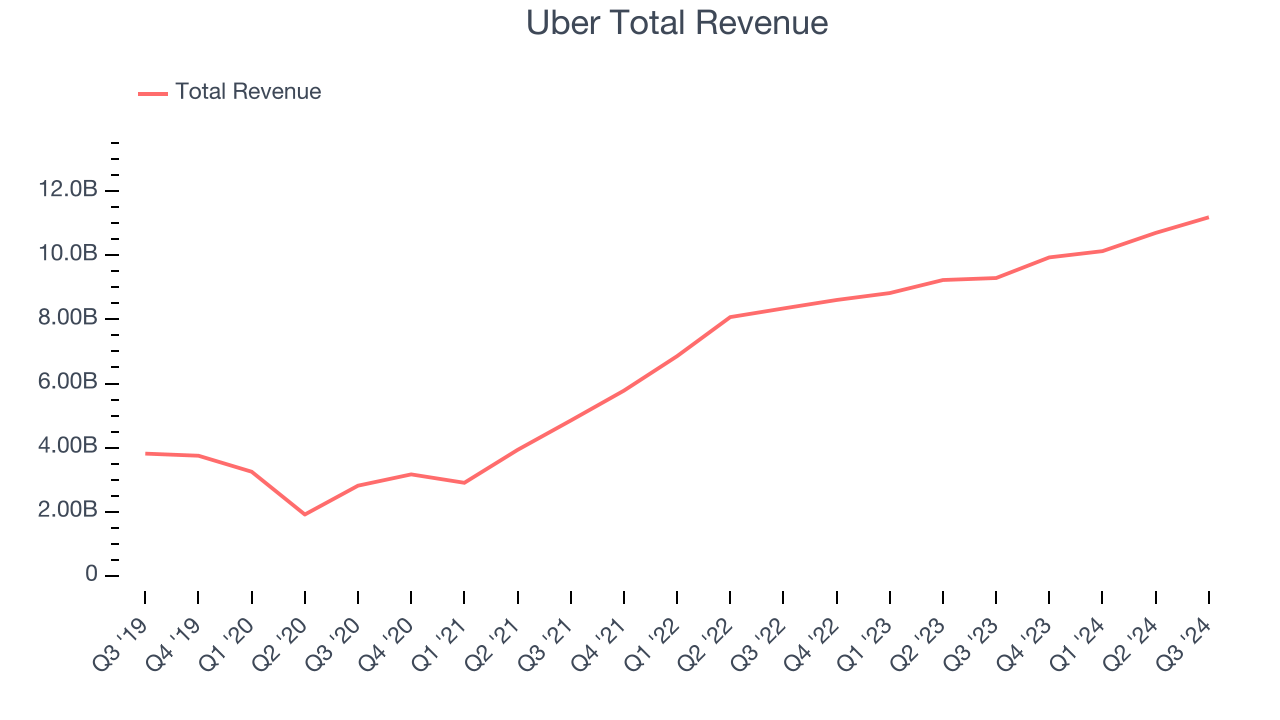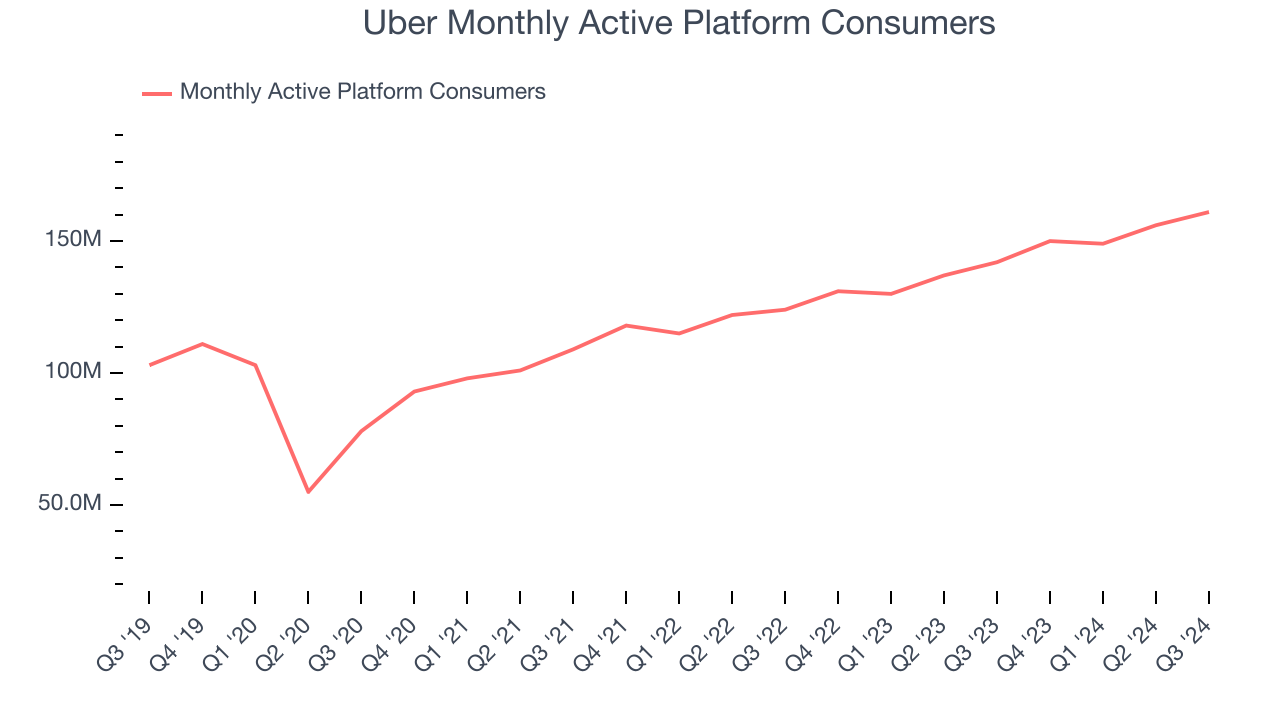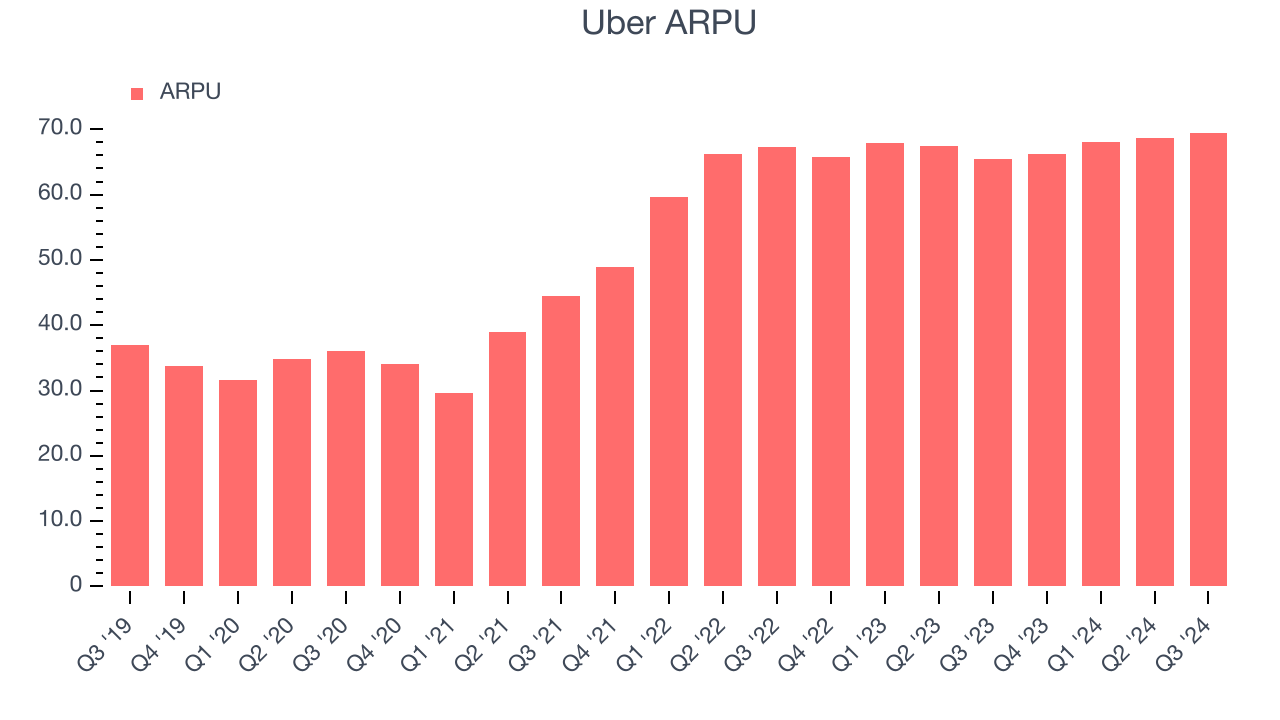Ride sharing and on demand delivery service Uber (NYSE: UBER) reported Q3 CY2024 results beating Wall Street’s revenue expectations, with sales up 20.4% year on year to $11.19 billion. Its GAAP profit of $1.20 per share was also 196% above analysts’ consensus estimates.
Is now the time to buy Uber? Find out by accessing our full research report, it’s free.
Uber (UBER) Q3 CY2024 Highlights:
- Revenue: $11.19 billion vs analyst estimates of $10.98 billion (1.9% beat)
- EPS: $1.20 vs analyst estimates of $0.41 (196% beat)
- EBITDA: $1.69 billion vs analyst estimates of $1.65 billion (2.5% beat)
- Gross Margin (GAAP): 39.6%, up from 32.1% in the same quarter last year
- Operating Margin: 9.5%, up from 4.2% in the same quarter last year
- EBITDA Margin: 15.1%, up from 11.8% in the same quarter last year
- Free Cash Flow Margin: 18.9%, up from 16.1% in the previous quarter
- Monthly Active Platform Consumers: 161 million, up 19 million year on year
- Market Capitalization: $166.9 billion
“We delivered yet another record quarter of profitable growth at a global scale, reflecting the strength of our platform, which now has over 25 million Uber One members,” said Dara Khosrowshahi, CEO.
Company Overview
Born out of a winter night thought: "What if you could request a ride from your phone?" Uber (NYSE: UBER) operates a global network of on demand services, most prominently ride hailing and food delivery, and freight.
Gig Economy
The iPhone changed the world, ushering in the era of the “always-on” internet and “on-demand” services - anything someone could want is just a few taps away. Likewise, the gig economy sprang up in a similar fashion, with a proliferation of tech-enabled freelance labor marketplaces, which work hand and hand with many on demand services. Individuals can now work on demand too. What began with tech-enabled platforms that aggregated riders and drivers has expanded over the past decade to include food delivery, groceries, and now even a plumber or graphic designer are all just a few taps away.
Sales Growth
A company’s long-term performance is an indicator of its overall business quality. While any business can experience short-term success, top-performing ones enjoy sustained growth for multiple years. Thankfully, Uber’s 41.4% annualized revenue growth over the last three years was incredible. This is a great starting point for our analysis because it shows Uber’s offerings resonate with customers.

This quarter, Uber reported robust year-on-year revenue growth of 20.4%, and its $11.19 billion of revenue topped Wall Street estimates by 1.9%.
Looking ahead, sell-side analysts expect revenue to grow 15.8% over the next 12 months, a deceleration versus the last three years. Some tapering is natural given the magnitude of its revenue base, and we still think its growth trajectory is attractive.
When a company has more cash than it knows what to do with, buying back its own shares can make a lot of sense–as long as the price is right. Luckily, we’ve found one, a low-priced stock that is gushing free cash flow AND buying back shares. Click here to claim your Special Free Report on a fallen angel growth story that is already recovering from a setback.
Monthly Active Platform Consumers
User Growth
As a gig economy marketplace, Uber generates revenue growth by expanding the number of services on its platform (e.g. rides, deliveries, freelance jobs) and raising the commission fee from each service provided.
Over the last two years, Uber’s monthly active platform consumers, a key performance metric for the company, increased by 13.4% annually to 161 million in the latest quarter. This growth rate is strong for a consumer internet business and indicates people love using its offerings. 
In Q3, Uber added 19 million monthly active platform consumers, leading to 13.4% year-on-year growth. The quarterly print isn’t too different from its two-year result, suggesting its new initiatives aren’t accelerating user growth just yet.
Revenue Per User
Average revenue per user (ARPU) is a critical metric to track for consumer internet businesses like Uber because it measures how much the company earns in transaction fees from each user. This number also informs us about Uber’s take rate, which represents its pricing leverage over the ecosystem, or "cut" from each transaction.
Uber’s ARPU growth has been impressive over the last two years, averaging 7%. Its ability to increase monetization while quickly growing its monthly active platform consumers reflects the strength of its platform, as its users continue to spend more each year. 
This quarter, Uber’s ARPU clocked in at $69.49. It grew 6.2% year on year, slower than its user growth.
Key Takeaways from Uber’s Q3 Results
It was good to see Uber beat analysts’ revenue, EBITDA, and EPS expectations this quarter. We were also glad it expanded its number of users. Overall, this quarter had some key positives. The market seemed to be hoping for even better results, however, and shares traded down 5.5% to $75.14 immediately following the results.
So should you invest in Uber right now? The latest quarter does matter, but not nearly as much as longer-term fundamentals and valuation, when deciding if the stock is a buy. We cover that in our actionable full research report which you can read here, it’s free.
